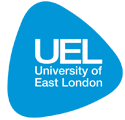Date: Wednesday, 23rd April, 2014
Time: 16:00-17:30 pm
Venue: Room 2.44, University Square Stratford, University of East London, 1 Salway Road, Stratford. London E15 1NN
http://www.universitysquarestratford.ac.uk/find-us.htm
The event is Free
You are invited to a PhD seminar event organised by the Centre of Performing Arts Development (CPAD) at the University of East London. This event seeks to investigate and develop dialogues between digital and non-digital participation in theatre practices.
16:00
Etheatre Project: Political Participation in Online Theatre, Christina Papagiannouli
Etheatre Project is a series of experimental cyberformances aiming to redefine the characteristics of theatre and the methodologies of theatre directing within the phenomenon of ‘remediation’ of cyberculture. By the use of online platforms, including UpStage and Waterwheel Tap, I explore the interactive and political potentials of online theatre. Cyberian Chalk Circle adaptation looked at the revolution of Egypt during 2011, Merry Crisis and a Happy New Fear was a verbatim performance about the current economic crisis in Greece and for Etheatre Project and Collaborators 8 distributed artists collaborated remotely to create a piece about migration. To accomplish public discussion about key political topics, Etheatre project developed the forms of real-time cyber-adaptation, cyber-ethnotheatre and cyber-collaboration with the audience for the co-creation of the performances, making the participants part of the collective ensemble. Cyberformance creates in-between spaces for the audience to actively fill in, while the participants can manifest themselves and chose whether they want to collaborate or not, stay silent or take active part in the happening. The paper discusses the remote participation of the cyberformance audiences, as dealt with by Dixon (2004), Miessen (2010) and Bay-Cheng, et al (2010).
16:30
Open Arena: Theatre of Testimonies, Anca Doczi
Open Arena: Theatre of Testimonies is an umbrella title for a series of performances performed and created by Immersive Theatre. Immersive Theatre is making use of Augusto Boal’s Forum Theatre and other means of creatively interrogating contemporary concerns by placing individuals and communities at the core of the theatrical production. By working with memory and oral histories brings into focus matters of identity and belonging. As a form of applied drama, forum theatre is closely related to present-day questions about the politics of context, place and meaning of social relations. This contextual theatre practice is intended to address the concerns of local audiences and participants, while theatre becomes the medium by which the society can be changed through the collective exploration of ideas. Open Arena is a creative research platform exploring the life of Romanian community in UK by collecting personal narratives and looking at how Romanian contemporary culture and identity might have been affected and shaken by the visible/invisible traces of the communist oppression. The research aims in understanding concepts like exile, refuge and migration in relation to historic, political and socio-cultural contexts. By means of participative theatre experiences and immersive performances, personal and community narratives will be explored. Through active participation, audiences are enabled to make decisions, to critically address the issues presented to them and to reflect on the social life within a safe environment offered by the theatrical design.
17:00
Open Discussion/Debate
The discussion aims to highlight the differences between the two forms, identify their strengths and weaknesses and suggest effective ways of using participation in online and offline theatre.
The Centre for Performing Arts Development (CPAD) at the University of East London is focused on developing original and innovative research in Performing Arts including Drama, Theatre, Performance Studies, Music, Dance and Creative Writing with a particular emphasis on socially engaged practices, performative cultures, practice-based research, and digital and interdisciplinary research.
